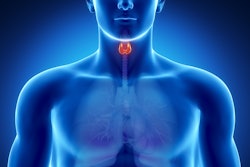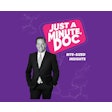As a general dentist, I’ve noticed that thyroid medications come up again and again in my patients’ health histories. And with them come questions we’ve all asked at some point: Is it safe to use epinephrine with this patient? Should I be concerned about levothyroxine?
With thyroid disorders affecting roughly 1 in 10 Americans -- many of whom are in our operatories each week -- it’s essential that we understand how these medications intersect with the care we provide.
Why this matters in dentistry
 Dr. Lisa Chan.
Dr. Lisa Chan.
Thyroid hormones influence everything from energy levels to metabolism, but their ripple effect extends into oral health and dental safety.
Whether a patient is managing hypothyroidism with levothyroxine or undergoing treatment for hyperthyroidism with methimazole or propylthiouracil, these medications can impact bleeding, healing, drug interactions, and even how they respond to local anesthesia.
This is why I recommend using tools like the MedAssent DDS Digital Drug Handbook, since it quickly highlights these potential dental implications at the chairside.
As dental professionals, staying informed about these medications isn’t just about best practice: It’s about preventing adverse outcomes. To ensure the safety and well-being of patients with thyroid conditions, you should obtain a detailed medical history, including information on which thyroid medications they are taking and their function.
The essentials: Common thyroid medications
Hypothyroidism
- Levothyroxine (Synthroid, levoxyl)
- This synthetic T4 hormone is one of the most commonly prescribed medications in the U.S. It’s generally safe for dental procedures, but watch for xerostomia and caries risk. Patients may also present with hypertension as a side effect, so ensure you check blood pressure preoperatively.
- Clinical tip: If you notice signs of poor control (fatigue, dry skin, slowed healing) consider collaborating with their primary care provider. These symptoms can affect recovery from invasive procedures.
- This synthetic T4 hormone is one of the most commonly prescribed medications in the U.S. It’s generally safe for dental procedures, but watch for xerostomia and caries risk. Patients may also present with hypertension as a side effect, so ensure you check blood pressure preoperatively.
Hyperthyroidism
- Methimazole (Tapazole)
- This medication is used to manage overactive thyroid function or prepare for surgery. This medication suppresses immune function. If your patient presents with unexplained mouth sores, gingivitis, flulike symptoms, or painful swallowing, don’t assume it's viral, it could signal a severe adverse effect like agranulocytosis. Refer promptly.
- Increased bleeding risk
- Used to manage overactive thyroid function or prepare for surgery. This medication suppresses immune function. If your patient presents with unexplained mouth sores, gingivitis, flulike symptoms, or painful swallowing, don’t assume it's viral -- this could signal a severe adverse effect like agranulocytosis. Refer promptly.
- Used to manage overactive thyroid function or prepare for surgery. This medication suppresses immune function. If your patient presents with unexplained mouth sores, gingivitis, flulike symptoms, or painful swallowing, don’t assume it's viral -- this could signal a severe adverse effect like agranulocytosis. Refer promptly.
- Other oral side effects include:
- Gingival inflammation
- Loss of taste
- Sialadenitis
- Increased bleeding risk
- This medication is used to manage overactive thyroid function or prepare for surgery. This medication suppresses immune function. If your patient presents with unexplained mouth sores, gingivitis, flulike symptoms, or painful swallowing, don’t assume it's viral, it could signal a severe adverse effect like agranulocytosis. Refer promptly.
- Propylthiouracil (PTU)
- Less common but used for Graves’ disease and goiter, this medication comes with a black-box warning for life-threatening liver toxicity. In the dental setting, avoid acetaminophen or combination analgesics containing acetaminophen, as these can compound the liver risk.
- Watch for:
- Taste changes or loss and salivary gland enlargement
- Signs of severe infection. Refer the patient to their physician if the patient has mouth sores, pain upon swallowing, gingivitis, fever, flu symptoms, or chills.
- Prolonged bleeding
- Taste changes or loss and salivary gland enlargement
- Less common but used for Graves’ disease and goiter, this medication comes with a black-box warning for life-threatening liver toxicity. In the dental setting, avoid acetaminophen or combination analgesics containing acetaminophen, as these can compound the liver risk.
Anesthesia and epinephrine: A risky mix?
 Barbara Madej, RPh.
Barbara Madej, RPh.
Yes and no. In most patients with well-managed thyroid conditions, using local anesthetics with epinephrine is considered safe. But in patients with uncontrolled hyperthyroidism, epinephrine can increase the risk of adverse reactions such as tachycardia and hypertension.
When in doubt, opt for using a local anesthetic without epinephrine or a lower epinephrine concentration. Confirm thyroid status before treatment and monitor vitals before and after the procedure.
Watch for drug interactions
- Levothyroxine + carbamazepine (often used for trigeminal neuralgia): This combo can reduce thyroid hormone levels, leaving the patient undertreated.
- Antithyroid meds + nonsteroidal anti-inflammatory drugs or acetaminophen: Use caution, especially with PTU. Always consult the patient’s medical history and their physician when in doubt.
Final thoughts
Thyroid medications are more than just another line on your patient’s med list. They can affect anesthesia tolerance, post-op healing, bleeding risk, and even your analgesic choices. A quick review, an extra blood pressure check, or one click in the MedAssent DDS platform might be the thing that keeps your patient safe (and their treatment successful).
Dr. Lisa Chan has devoted her career to promoting equity in care in both dentistry and her community. She brings over 35 years of diverse experience in dentistry to her role. Chan received her Doctor of Dental Surgery degree from the University of Southern California Herman Ostrow School of Dentistry. Her background includes significant positions such as a hospital dentist at Kaiser Permanente, a private practice dentist in Los Angeles, and a consultant for the California State Dental Board. Chan co-founded MedAssent DDS with the mission of elevating patient safety through integrated care.
Barbara Madej, RPh, is a licensed pharmacist who has dedicated her life to serving her home country of Canada, as well as her new home of Los Angeles, after receiving her degree in pharmacy from the University of Saskatchewan. Madej co-founded MedAssent Rx in 2015, drawing from her decades of experience in pharmacy and putting her passion to action.
Aubrey Glassberg plays a vital role in content development and editorial review, ensuring that articles are both insightful and clinically relevant for dental professionals. In addition to her editorial work, Glassberg oversees various projects at MedAssent DDS, including the management of its comprehensive medication database, helping bridge the gap between dentistry and pharmacology.
The comments and observations expressed herein do not necessarily reflect the opinions of DrBicuspid.com, nor should they be construed as an endorsement or admonishment of any particular idea, vendor, or organization.



















